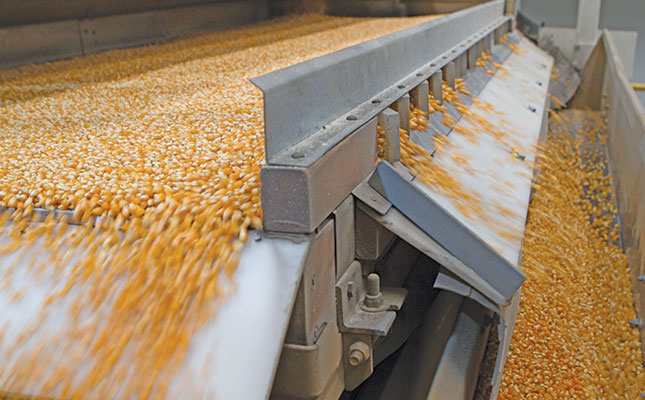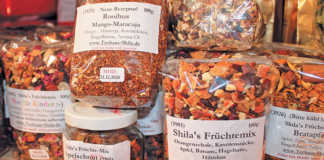
Photo: Sabrina Dean
A targeted export growth strategy has triggered remarkable growth for Biggi Brands, a popcorn factory in Hopetown in the Northern Cape.
According to director Koos de Wet, the company plans to continue expanding its export footprint by providing consistent quality and supply.
“Our brand is built on relationships with clients and people in the industry who want a reliable supplier that can deliver consistent quality,” he says.
Biggi Brands was established by Johan Kriek, Attie Victor and Lieb du Raan in 1991 after local co-operatives identified popcorn maize as a crop well suited to the region. In addition, growers had access to clean water from the Orange River for irrigation.
The company’s main line is unpopped popcorn kernels sold in 25kg bags. The maize is produced by contract growers under strictly regulated practices. It is then harvested and stored at appropriate moisture levels in silos at the factory and off-site grain storage facilities. On-site storage capacity is about 12 000t.
The kernels are then cleaned, processed and bagged for distribution to various clients. Local clients include major food processors who manufacture ready-to-eat popcorn snacks.
Popcorn and more
Biggi Brands supplies the cinema market across the country with popcorn kernels, oil for the popping process, and spices. In addition, it is the sole South African distributor of Gold Medal popcorn equipment used by cinemas and retail outlets making freshly popped popcorn.
The factory also has a specific microwave popcorn facility that produces six flavours of microwave popcorn.
Despite its success in the local popcorn market, Biggi Brands obtains the lion’s share of its revenue (about 70%) from exports, and it is this area that is largely responsible for almost doubling the company’s annual production over the past three or four years to between 15 000t and 16 000t of raw popcorn kernels.
Consistency
The maize that produces the company’s popcorn is grown on about 2 000ha, according to De Wet. A number of varieties are grown under irrigation and all seed is imported from the US.
“There are four or five seed companies in the US, so we select the varieties that are suitable for us,” he says. All are non-GMO hybrids.
Biggi Brands uses two kinds of popcorn: the ‘butterfly’ type, favoured for savoury popcorn snacks, and the ‘mushroom’ type, preferred for sweet treats such as caramel-coated popcorn.
“We import about three cultivars of each,” says De Wet, adding that they also plant trial plots every year to evaluate cultivar performance.
Planting generally starts around November, although a small number of growers in regions without frost may plant as early as August. Harvesting usually begins around April the following year.
For the most part, the equipment is the same as that used on maize for maize meal.
“The only difference is that some varieties have a very thin cob, so the harvester head must be set very narrow, otherwise it just pulls the cob through,” he says.
“The drum speed also has to be lower to avoid cracking the kernels.”
The relationship with their growers is important, De Wet stresses; the company uses a pool of 10 farmers, most of whom have been producing for Biggi Brands on contract for years.
“We expect our growers to produce for us every year, because we have customers who need consistent supply from year to year, so we can’t produce too much one year and not enough the next.”
The farmers have to plant a non-GMO variety and must therefore appreciate the production risks, which include threats such as pests and diseases, due to the lack of built-in resistance in non-GMO varieties. They also have to follow proactive treatment schedules and scout their lands regularly.
De Wet emphasises the importance of irrigation management during crop growth. Water quality, too, is crucial, as the end product must be able to comply with quality tests administered at export destinations.
It is essential that the growers produce a high-quality crop and deliver it at the correct moisture percentage (13% is optimal). This has a major influence on how the popcorn pops.
“The farmers must also have their harvesters well calibrated so they don’t deliver a high percentage of broken kernels,” De Wet adds.
Moisture management at the factory is also critically important, and the harvest must be stored appropriately so that it can be processed as orders come in during the year.
The factory
“The processing basically comprises a dry grain cleaning process that uses sieves and gravitation tables to clean the kernels,” De Wet explains.
Much of the grain is delivered directly to the four steel silos at the factory premises. These are connected to a complex transport system that conveys the grain from the storage area to the factory.
According to Jacques Louw, the chief financial officer of Biggi Brands, they have to keep their wits about them at harvest time, especially during their peak intake period.
“There’s a tremendous spike then, and we need many extra hands as the deliveries come in. The trucks often stand bumper to bumper out into the main road and we have to scramble to offload, grade the maize, test kernel quality, and do all the other extra work at that time of year,” Louw says.
Inside the factory, the grain is sifted and the by-product material placed into bags and sold as animal feed. The clean kernels are transferred to a gravitation table, which serves to sort it into two sizes.
The larger, heavier kernels gravitate to the bottom and the lighter ones end up on another part of the table; this enables them to be channelled into two streams.
Uniformity of size is a key factor, as kernels of various sizes could pop differently from one another.
The kernels are then transferred to plastic-lined bags, which are stitched closed. These are placed on pallets, shrink-wrapped and dispatched.
Quality control
All the kernels passing through the factory and the microwave facility undergo sample tests at various stages. A kernel sample is taken by an operator along the bagging line every few bags. The kernels have to meet certain criteria in terms of moisture, expansion, foreign matter and appearance.
“We look at the expansion of the kernels: how big they are when they pop. This is based on an industry standard used across the world,” says Louw.
Popcorn kernels are marketed in three different grades, namely Premium, P1 and P2. The grade is determined by the popping ratio and the kernel count (how many kernels per 100g).
Different clients require different characteristics, depending on what the popcorn is used for. Some, such as grain traders, make their purchases based on the appearance of the kernels, while others deem the volume of the popped product to be more important.
Growth and planning
De Wet says that although they have experienced major growth in recent years, there is scope for even more. Nonetheless, they are careful not to overextend themselves, as their focus is on the premium market, not the bulk market, where traders sell as much popcorn as possible for the lowest price.
According to Louw, Biggi Brands is starting to focus more on the value-added side of the business and product development.
“We believe there are many opportunities in the domestic market for us to explore. This is a higher-margin business that can drive increased profitability.”
Phone Koos de Wet or Jacques Louw on 053 203 0403, or email [email protected].













